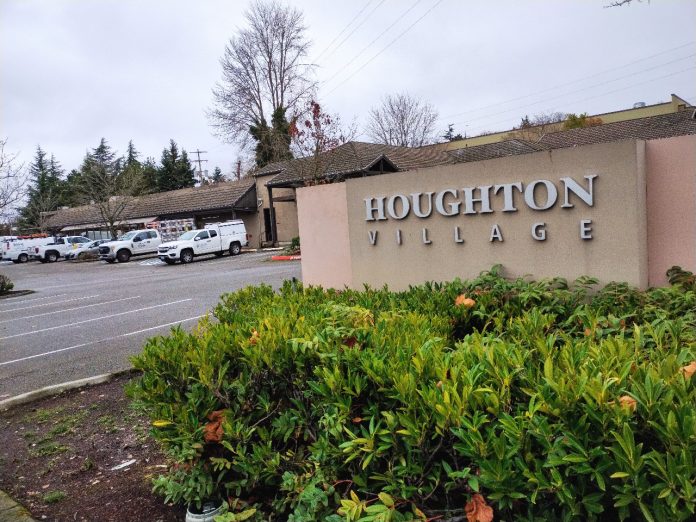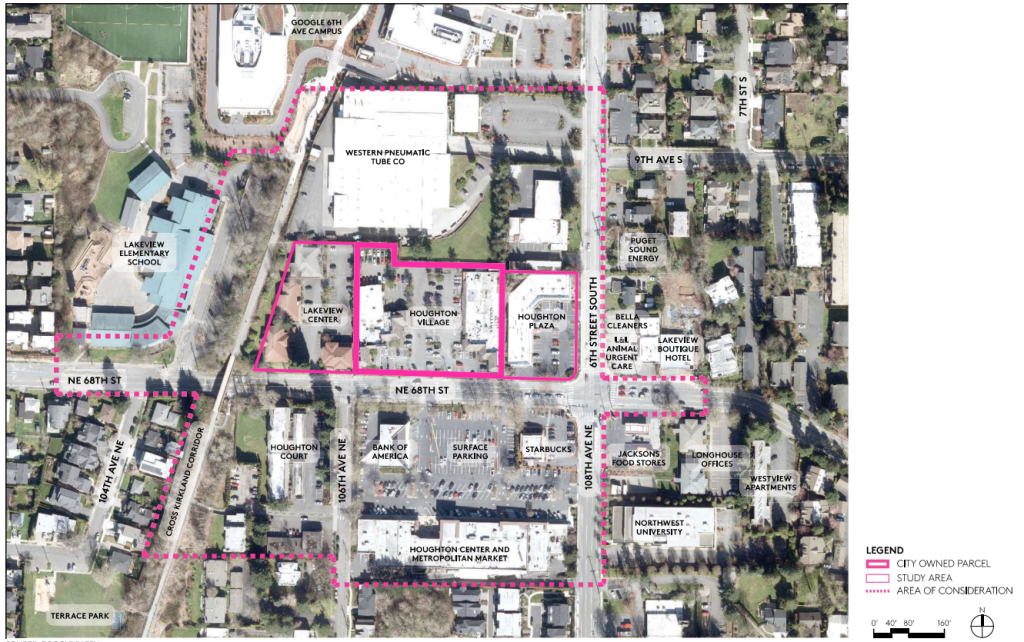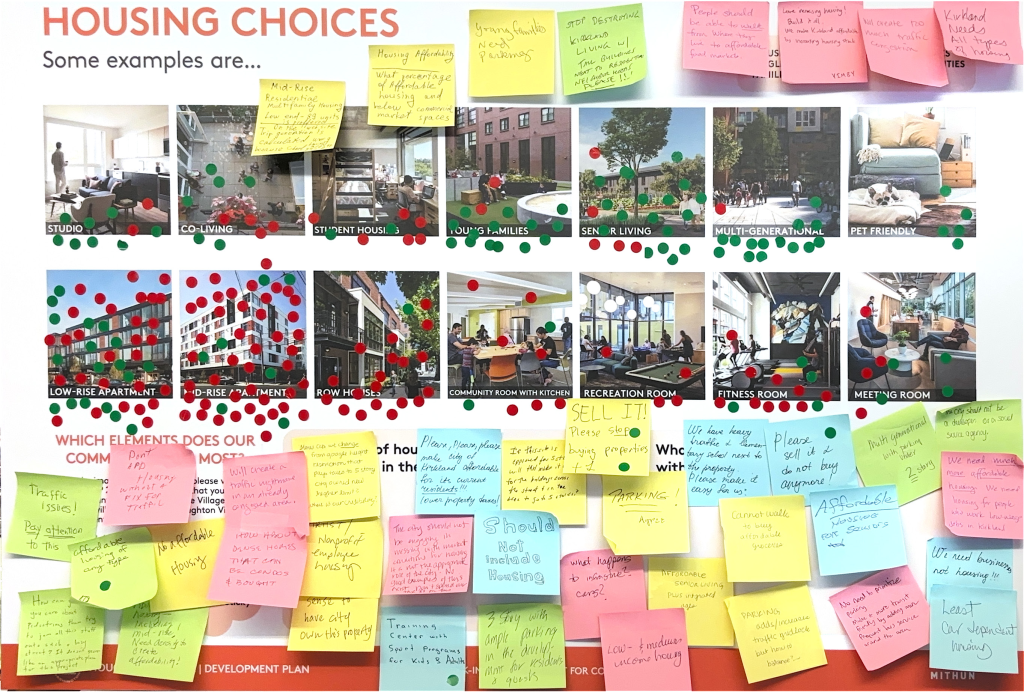
The question of how to transform an underutilized strip mall into the core of a walkable urban neighborhood close to frequent transit and a major regional trail is about to be put front-and-center in Kirkland. At issue is the Houghton Village shopping center, a 2.2-acre property the City of Kirkland purchased for $14 million in 2022, with the express purpose of providing public benefits like space for nonprofits, arts organizations, recreation, and affordable housing.
The debate is likely to expose tensions between current neighborhood residents seeking to maintain their status quo and advocates and local officials trying to prioritize community needs like affordable housing and access to amenities in a growing city. Project materials refer to hopes of spurring a 10-minute neighborhood, a concept in which residents can meet their basic needs within a short walk of their home, akin to Seattle’s quest to create 15-minute neighborhoods.
Located near the intersection of NE 68th Street and 6th Street S, the property is a stone’s throw from Google’s primary campus in Kirkland, steps from the future K Line bus, next door to a highly-rated public elementary school, and adjacent to Cross Kirkland Corridor, a segment of the Eastrail multi-use trail that will eventually stretch from Renton to Snohomish County. Though the area is zoned for mixed-use commercial development, it hasn’t seen high-density projects like Kirkland’s other growth centers, such as Downtown and Totem Lake. “The Houghton Village Shopping Center […] offers the City a strategic opportunity to accomplish multiple important community benefits all within a walkable ten-minute neighborhood with frequent transit service,” the city’s project website notes.

To pay for the property, Kirkland city government loaned itself the money via what’s called an interfund loan, and that loan comes due in May of 2025, so city staff have been working toward coming up with a financing plan and a potential development partner by the time that happens. Earlier this year, the city contracted with the design firm Mithun to produce a draft development plan that the Kirkland City Council is expected to approve by the end of the year.
“When redeveloped, the existing strip-mall style developments with parking in front of the buildings can give way to vibrant, pedestrian-oriented development with storefronts and community-oriented ground floor spaces activating improved and widened public sidewalks, with cars tucked to the rear of their sites,” An overview created by Mithun and circulated earlier this month noted. “Improved bike facilities along NE 68th Street can improve safety for cyclists travelling west, and a safer crossing could be created along NE 68th Street at NE 106th Avenue.”
Putting city government in the driver’s seat when it comes to redeveloping a site like this is unusual but certainly not unprecedented, and is intended to maximize the leverage that the City has over what public amenities are ultimately included.
“If the City hadn’t had an opportunity to purchase a site, it would have been sold to a commercial developer, and the city would have no control, other than the controls we have with respect to any development,” Councilmember Neil Black said during a council study session on the property last week. “If this was just to get acquired by a commercial developer, we’re not going to get the arts and cultural space that we’ve talked about, we’re not going to get space for nonprofit organizations that we’ve talked about, we’re not going to get the space for educational purposes that we’ve talked about.”
One central question is likely to be: how much market-rate housing will be included in the plan to make the other elements, including community space and affordable homes, pencil out as feasible for the developer. At last week’s open house, attendees were asked to put colored dots on potential deliverables for the Houghton Village property, with green dots indicating support and red dots indicating dislike. Even “low rise apartment” got more red dots than green, and “mid rise apartment” ended up being covered predominantly in red.

On the north side of NE 68th Street, the Houghton Village property sits within Kirkland’s Everest neighborhood. However, just to the south, the Houghton neighborhood has a long history of pushing back on land use changes and dense development projects. Often the vehicle for this pushback was the former Houghton Community Council, one of just two community councils in Washington that had the ability to veto certain land use decisions that were approved by the broader city government until the legislature finally sunset those powers in 2022 via House Bill 1769. The path for changes is now more straightforward, but not necessarily smooth.
In the coming months, it will fall to the Kirkland City Council to thread the needle between the desires of activist homeowners and its broader priorities, keeping in mind the city expects to add over 13,000 new residents over the next two decades.
“The way I view this project, this is an asset for the entire city of Kirkland,” Councilmember Black said. “There has been sometimes, in some of the comments and remarks we’ve gotten, the focus is on what the immediate neighbors are going to want to decide. And we just need to acknowledge that what we’re really contemplating here with the arts, and the culture and educational opportunities and nonprofit opportunities, affordable housing is really meant to be a community benefit for the entire City of Kirkland.”
Black’s comments brought some pushback from Kirkland’s newest councilmember John Tymczyszyn.
“With regard to the residents around that area, I think I disagree with some of my colleagues in that I do value the opinions of the directly geographically impacted neighborhoods. And if we’re going to bring them something great, we shouldn’t have to force it upon them, they should want it,” Tymczyszyn said.
Mayor Kelli Curtis, specifically citing the potential for the Houghton Village redevelopment to be a model for the region, made it clear she thinks the city is going to be able to find a path forward.
“I’m optimistic that we are going to be able to satisfy everyone’s needs, that we are going to provide a location that’s going to serve the local community, that we are going to be able to provide creative, affordable housing that’s going to meet a desperate need in our community,” Curtis said. “So often we are in conversations in our regional committees or local committees about how difficult it is to provide services and affordable housing and nonprofit space. And we’re going to prove an example of how we can get that done as a city and what it takes to get it done.”
Ryan Packer has been writing for The Urbanist since 2015, and currently reports full-time as Contributing Editor. Their beats are transportation, land use, public space, traffic safety, and obscure community meetings. Packer has also reported for other regional outlets including BikePortland, Seattle Met, and PubliCola. They live in the Capitol Hill neighborhood of Seattle.

